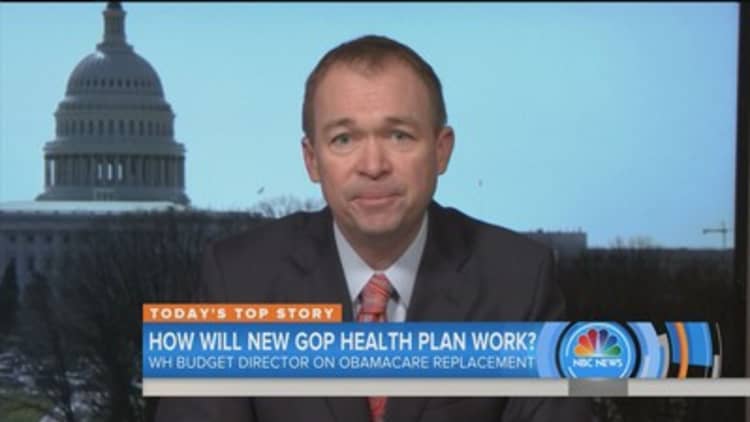
The new Republican health plan tries to keep the popular parts of Obamacare, such as allowing children to stay on their parents plans until age 26, and making insurers cover people with pre-existing conditions, while getting rid of parts people don't like such as the individual mandate.
It also expands tax credits.
GOP leaders are calling the American Health Care Act, released on Monday, the first three phases in the process of repealing and replacing Obamacare, under a budgetary process that will ultimately allow them to pass the bill through a simple majority in the Senate.
But critics say the bill will not help stabilize the individual market or result in lower prices.
"The risk here is we've got these fundamental reforms that include tax repeals, that undermine the system," said Michael Barnes, managing partner at the DCBA law firm in Washington and a former confidential counsel in the White House Office of drug policy under the George W. Bush administration.
"Without an individual mandate repeal that is somehow balanced by a stronger incentive to get people to buy insurance, you don't have enough of a base for there to be affordability," said Barnes.

One of the things that has drawn the most criticism from conservatives is the way the GOP bill widens the use of tax credits, prompting them to call it "Obamacare lite." Republican leaders and the Trump administration pushed back on that charge.
"We need to equalize the tax treatment for the purchase of coverage," said Health and Human Services Secretary Tom Price. "Those … in the employer-sponsored market, they get a tax benefit for buying health coverage. Those folks that are out there in the individual small group market, (get) no tax benefit and that's what this plan would (fix)."
How GOP tax credits works
The Affordable Care Act provides tax credits for lower-income Americans, but under the GOP plan the big difference is how tax credits would be calculated, and who would get them.
Under the ACA: Your income and the cost of your insurance determine your tax credit, phasing out for those earning more than $47,000 in 2017.
Under the GOP plan: Refundable tax credits are based on your age and get phased out if you earn more than $75,000 year, starting at $2,000 annually for individuals in their 20s, and up to $4,000 for those in their 60s. For a household with multiple adults, the maximum tax credit would be $14,000 a year.
The former administrator for the Centers for Medicare and Medicaid said the GOP tax credit changes would result in lower-income people losing ground on affordability.
"The president says he's going to put forward a replacement bill that would cover the same number of people more affordably. This unfortunately doesn't do that," said Andy Slavitt, who served as CMS director during the last two years of the Obama administration.
Tax credit winners & losers
The GOP plan could result in less generous benefits for many of the ACA's winners — older, low-income people. The ACA's losers — high income earners who got no Obamacare tax credits —would gain new tax breaks to buy insurance, as well as relief from the repeal of taxes on high-income earners that helped pay for Obamacare.

Here's how the tax credit amounts would change for an older enrollee in a high cost market like Mobile, Alabama, according to an analysis by the Kaiser Family Foundation.
Under the ACA in 2017, for exchange plans:
- 60-year-old with $20,000 income now gets $13,200
- 60-year-old with $40,000 income now gets $10,100
- 60-year-old with $60,000 income now gets $0
Under the GOP's tax credit proposal, for any individual market plan:
- 60-year-old with $20,000 income would get $4,000 (70% less than under ACA)
- 60-year-old with $40,000 would get $4,000 (60% less than under ACA)
- 60-year-old with earning up to $75,000 would get $4,000
But under the GOP plan, insurers would also be allowed to charge 60-year-olds rates up to five times higher than those for younger people. Under the ACA, older enrollees are charged only three times as much.
Analysts at S&P Global estimate that the GOP insurance changes could result in 20 percent cheaper plans for people in their 20s, and increase premiums by 30 percent for people in their 60s, who would likely then drop coverage. S&P sees a net reduction of 2 million to 4 million in individual market enrollment.
"What happens when people can't afford insurance is that the only people that tend to buy it are the sicker people," said Slavitt. "This (plan) is not only going to cover fewer people, but it's actually not going to be good for the risk pool, either."
Employer mandate repealed, Cadillac tax stays
The GOP plan also repeals the Obamacare employer mandate, which requires companies with more than 100 full-time workers to provide health coverage.
However, the plan keeps ACA's so-called Cadillac excise tax on high-cost plans, pushing it back to 2025.

At RHA Health Services in Asheville, North Carolina, Misty Guinn and her benefits staff are already starting to explore what kind of health insurance options the company will offer in 2018. They've operated under the assumption that employer benefits will someday be taxed.
"Within the benefits world, the Cadillac tax has been some kind of mythical creature that may or may not happen," said Guinn, RHA's director of benefits and wellness. "I feel that we already made strides, to reduce the value of our plans."
In 2015, under the ACA, the firm found that it was actually more cost-effective for the firm to pay the employer mandate penalty for their lowest income workers, so that they could qualify for more affordable care on the Obamacare exchange.
Working with the online benefits firm Benefitfocus, RHA switched to higher deductible plans in 2016 and other voluntary options that help employees pay for out-of-pocket costs. That has allowed them to control premium increases and health costs.
For now, RHA plans to continue offering benefits to its employees, regardless of what happens in Congress.
"If the ACA stays, or the ACA goes away, we're still going to be offering more options for our employees," said Guinn.
Until the Congressional Budget Office has weighed in on the American Health Care Act, there are no official estimates on how many people will be covered or could possibly lose coverage under the bill, or how much it will cost.
Correction: This story was revised to correct the spelling of Asheville.


